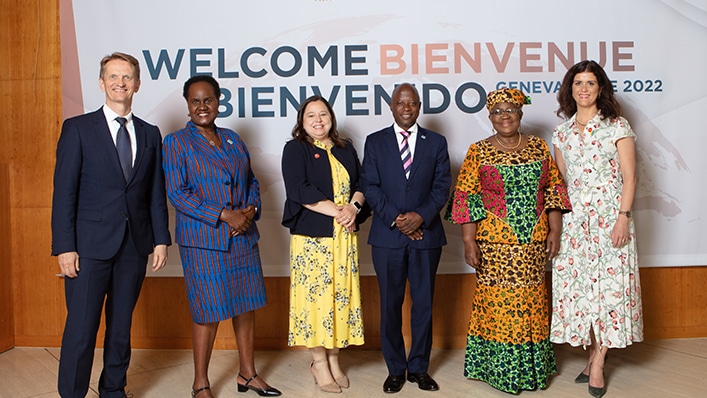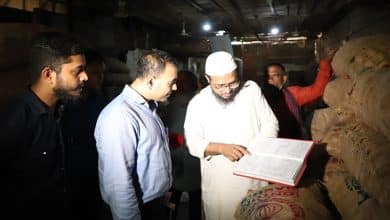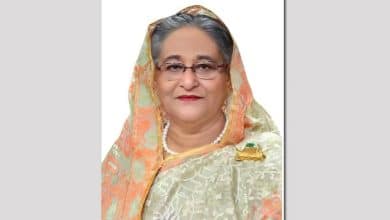WTO Ministerial Conference #MC12: what the IOE&IT did in Geneva this week

After a sometimes tense six-day ministerial meeting, the World Trade Organisation (WTO) reached a number of agreements at its 12th conference in Geneva.
“Many tough conversations have taken place during MC12, but the resolutions coming out of the WTO clearly demonstrate there is a global consensus that international trade is a force for good,” said IOE&IT director general Marco Forgione, who attended the conference with IOE&IT colleagues.
He added: “The WTO has a vital role to play in ensuring that nations adopt multilateral trade rules which enable businesses to benefit from international trade now and in the future. We look forward to continuing to work closely with the WTO on a series of initiatives over the coming years to empower businesses and individuals through education and support.”
Forgione and team were active on the conference floor throughout the week, discussing such issues as: gender in trade, meeting international ambassadors and pursuing new opportunities to promote UK exports at other international conferences.
Above: deputy executive director of the International Trade Centre, Dorothy Tembo, and IOE&IT director general Marco Forgione, signing a Memorandum of Understanding for further training for SMEs.
1. IOE&IT at #MC12: gender issues
The IOE&IT met with gender units from the three most important international bodies – the WTO, the United Nations Conference on Trade and Development (UNCTAD) and International Trade Centre (ITC) – to discuss women in trade and how IOE&IT can partner with each organisation to make trade more inclusive and equitable.
Above: WTO director general Ngozi Okonjo-Iweala (front, second left) with IOE&IT director general Marco Forgione (front, second right).
2. IOE&IT at #MC12: MSMEs platform launch
The IOE&IT also met with Uruguayan Ambassador José Luis Cancela coordinator of the WTO Informal Working Group on MSMEs, as well as other members of the group and the WTO Secretariat to launch a new partnership between the WTO and IOE&IT on the Trade4MSMEs platform.
Above: IOE&IT director general Marco Forgione (left) with Ambassador José Luis Cancela (right).
3. IOE&IT at #MC12: trade facilitation
Earlier in the week, the IOE&IT met a delegation from the Uzbekistan government, headed by Deputy Minister of Investments and Foreign Trade Badriddin Abidov (above, third right), to discuss trade facilitation and capacity building.
4. IOE&IT at #MC12: observer status
Meeting with the World Intellectual Property Organisation (WIPO), the IOE&IT was pursuing observer status for the Institute. The purpose: to use the WIPO and IOE&IT’s combined resources to educate traders on identifying and protecting IP within their businesses, as well as starting dialogue on programmes targeting education on combatting fraudulent activity in trade.
Above: IOE&IT director general Marco Forgione (left) with Professor Sangeeta Khorana MIEx, Chair of Academic Board at the IOE&IT.
5. #MC12 agreement reached: WTO reform
The WTO’s 164 members agreed to update the organisation’s working practices and try to reinvigorate its dispute-settlement system, reports the FT.
It agreed to embark on a process to reform the organisation, which is beset by problems that have made it difficult to negotiate new trade deals and to resolve trade disputes.
There is “widespread recognition that the WTO’s core functions need to be updated and improved,” director general Ngozi Okonjo-Iweala said.
6. #MC12 Agreement reached: E-commerce Moratorium extended
Trade ministers temporarily extended duty-free trade in digital products, such as films, software, and data. The provisional deal will last until the next ministerial meeting, expected in 2023.
The prospect of an end to the moratorium had been a key concern of businesses. As previously covered in the IOE&IT Daily Update, India and South Africa had threatened to block its renewal.
UK trade minister Anne Marie Trevelyan said: “We know that businesses, in both developed and developing countries, wanted us to guarantee tariff-free digital trade. I am happy to say that we delivered for them. In the digital age, the E-Commerce Moratorium provides certainty and lowers costs for global supply chains. And, in time, we want to see this moratorium made permanent.”
Allowing the digital duty ban to expire would have been an embarrassment for a body that prides itself in reducing trade barriers, reports Politico.
7. #MC12 agreement reached: Food security
Members reached a deal to ensure that the UN’s World Food Programme can source products, regardless of any export bans or restrictions. The UN has said that it was facing difficulties in buying food because of trade barriers.
Talks to reduce agricultural subsidies were put aside, but countries agreed to prohibit restrictions on the sale of their food to the World Food Programme.
In light of the Ukraine war’s effect on supply chains, the WTO approved a broad statement on the important role that trade plays in global food security. It does not bar countries from imposing export restrictions on food products, but discourages this, and reiterates the WTO principle that any such measures be temporary.
IOE&IT reaction
Welcoming the announcements at the conclusion of WTO MC12, Forgione said: “MC12 can be hailed as a success and the extension of the moratorium on e-commerce tariffs was an essential element of that.
“However, the work starts now to find a resolution by the next ministerial conference to ensure we do not impose tariffs on digital goods and services as this would be detrimental to businesses around the world.”





